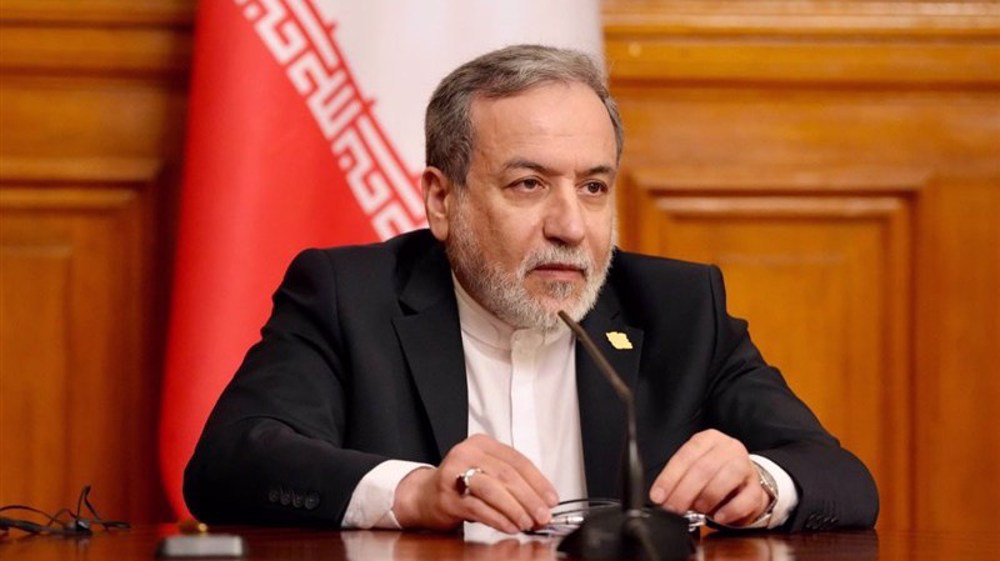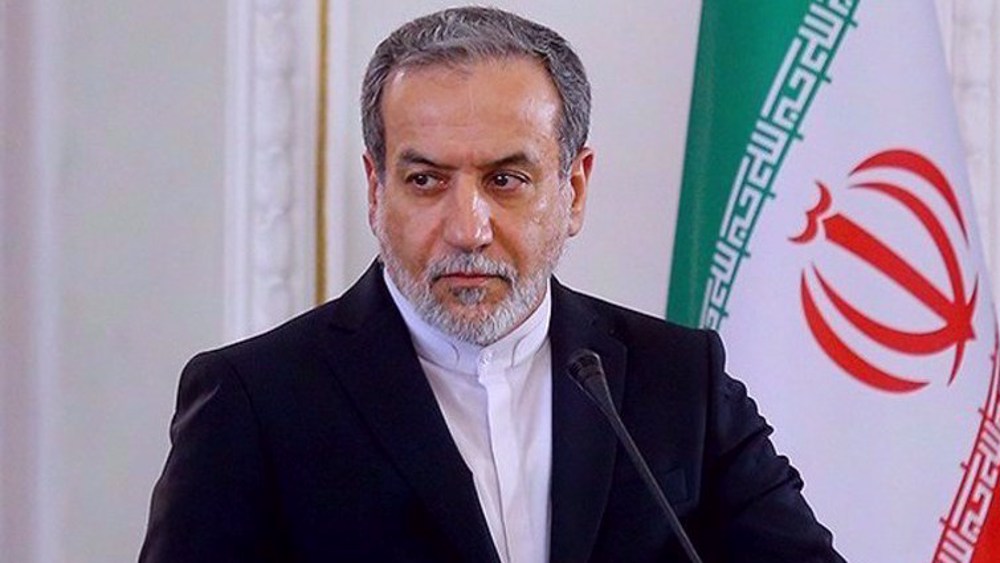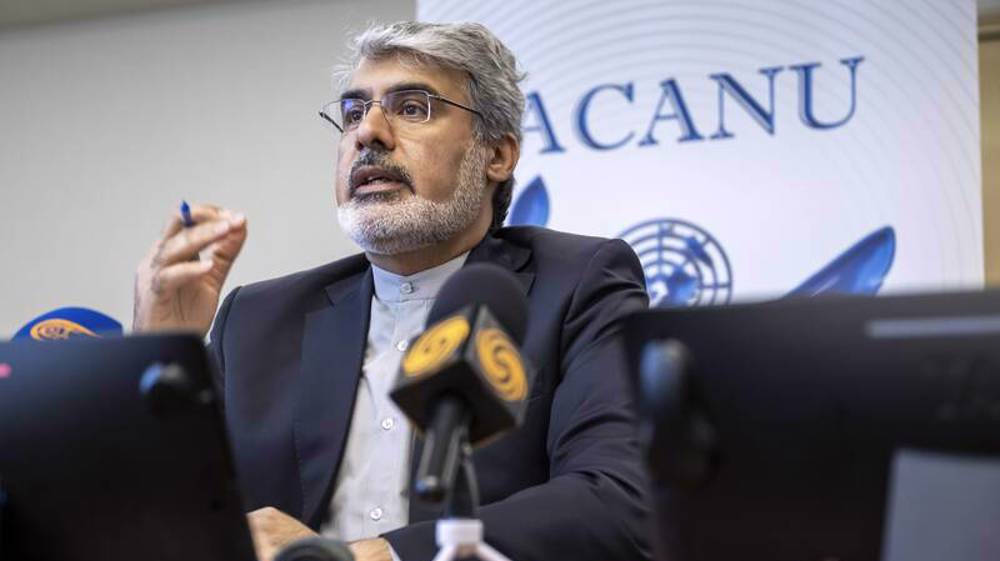US cannot create insecurity in Persian Gulf: Iran's FM Zarif
Foreign Minister Mohammad Javad Zarif has emphasized during his tour of Northern European countries that Iran invests all its efforts in ensuring security of the Persian Gulf, asserting that the United States cannot cause insecurity in this strategic region.
“They should know that they cannot create insecurity [here],” the top diplomat stated while making a speech at the Norwegian Institute of International Affairs (NUPI) on Thursday, reminding that Iran’s Persian Gulf coastline stretches as far as 1,500 miles (2,414 kilometers), making it the longest among the body of water’s littoral states.
The country also enjoys control over half of the expanse of the Strait of Hormuz, Iran's foreign minister said, adding that provision of security for the lifeline shipping route is impossible without participation of the Islamic Republic.
The United States has announced plans to form a coalition to supposedly protect shipping in the Strait of Hormuz following a series of mysterious attacks on oil tankers in the strait and the Sea of Oman.
Washington has accused Iran of having a hand in those attacks, a claim Tehran has strongly rejected. Tehran has warned that such acts of sabotage may be part of a general ploy to target Iran amid increasing regional tensions.
The US has asked its allies to join the coalition, a call which has not been warmly received by several countries, including Germany, Japan and Spain, over apparent fears that such a mission could further ratchet up tensions with Iran.
“Should any one favor security in the Persian Gulf, it must seek security for all [of its coastal countries],” Zarif said, expressing the Islamic Republic’s readiness for interaction with all those who are interested in collective action aimed at ensuring regional security.
The foreign minister said Iran has proven its disinclination towards escalating tensions, citing the country’s bilateral and multilateral negotiations with the previous US administration that resulted in the conclusion of a 2015 nuclear agreement between Tehran and major world powers, which if officially known as the Joint Comprehensive Plan of Action (JCPOA).
‘US on the wrong side, not Iran’
“But the US chose to exit the accord and pursued the policy of maximum pressure and economic warfare against Iran,” Iran's foreign minister said, referring to the current US administration’s undertakings. “It was them who started the war against us. We did not take any action against them,” he added.
Zarif, meanwhile, noted how American authorities had thought that Iran would “fall apart” within seven days of their adopting of the approach.
The country, however, withstood the pressure as it has against all aggressors, including Genghis Khan and Iraq’s former dictator Saddam Hussein. “We have been standing tall there for the past 7,000 years,” Zarif said.
Fruitful end to Scandinavian tour.
— Javad Zarif (@JZarif) August 22, 2019
In #Norway, met with PM @erna_solberg, FM EriksenSoreide, Min of Trade & Industry as well as parliamentarians. At @nupinytt, I stressed necessity of both multilateralism & rule of law in age of reckless US unilateralism.
Next stop: #France pic.twitter.com/4tUfBIvIi2
‘Iran ship was not in violation of EU laws’
Those choosing to act against the Islamic Republic have now come to resort to “threaten our maritime security,” Zarif said, citing Britain and Gibraltar’s detention of Iranian supertanker Adrian Darya 1, previously named Grace 1, off Gibraltar early last month.
The ship was seized based on the allegation that it was violating the European Union’s unilateral sanctions against Syria by taking oil to the Arab country.
“This is while we know that the EU’s laws cannot be implemented extraterritorially,” the Iranian foreign minister said, adding, “All should commit to international law. If countries do not respect international law, chaos will ensue.”
‘US cause of insecurity in Persian Gulf’
Later on Thursday, Zarif took part in a press conference with his Norwegian counterpart, Ine Marie Eriksen Søreide, in the Norwegian capital, slamming presence of foreign forces in the Persian Gulf as a cause of insecurity.

Zarif made the remarks when asked whether Norway would join a US-proposed military coalition in the Persian Gulf.
“The United States is the cause of insecurity in the Persian Gulf. This region is already crowded [with foreign military forces] and we must not allow the risk of accidents to increase there,” Iran's top diplomat said.
He described Iran as “the most important pivot of shipping security in the region,” and observed that a military build-up would not contribute to regional security.
The Islamic Republic has made respect for shipping freedom a plank of its policy, Zarif said, urging all other countries to behave likewise.
He defined respect for the principle of multilateralism as “one of our biggest concerns.”
Zarif finally said he would be traveling to Paris at President Hassan Rouhani’s behest to discuss with the French officials proposals offered by French President Emmanuel Macron for saving the nuclear agreement and “arriving at common grounds.”
Macron has recently stepped up diplomatic contacts with Tehran in a bid to allegedly cease the US economic war against Iran and deescalate tensions in the region.
The French president's top diplomatic advisor traveled to Iran to hold talks with the country's officials with the aim of contributing to easing tensions in the Persian Gulf region.
According to a French presidency official, Emmanuel Bonne "did indeed travel to Iran on June 19 ... to hold high-level talks with the objective of contributing to a de-escalation of tensions in the region."
Israeli military chief warns Netanyahu, Katz of manpower crisis undermining military readiness
Iran Judiciary chief: Enemy turned to rumors after defeat in riots
Iran dismantles terrorist cell: Ringleader killed, 11 members arrested
Netanyahu joins familiar circle of war at heart of Trump’s Gaza plan
‘Eulogy for globalist hypocrisy’: Netizens react to Canada PM’s speech on end of ‘rules-based order’
US Treasury Secretary boasts about harming Iran economy, fueling unrest
Thousands protest Trump’s immigration policies on second term anniversary
Ex-NATO chief slams Trump’s Greenland threats, calls on EU to hit back
















 This makes it easy to access the Press TV website
This makes it easy to access the Press TV website